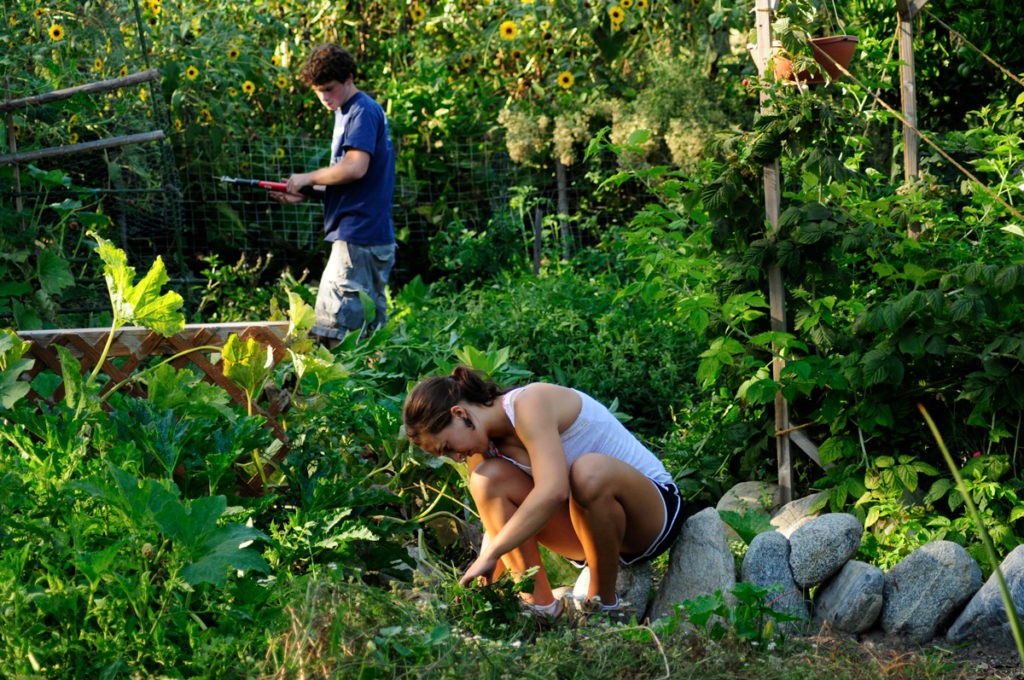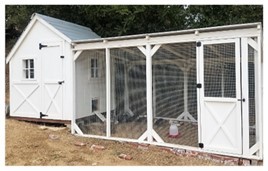 Students working in the organic garden in 2008.
Students working in the organic garden in 2008.In honor of Earth Day 2021, the sustainability team in Pitzer College’s Office of Facilities and Campus Services would like to share some news about plans to refresh the College’s Student Garden. Pitzer, which was recently ranked #5 on Princeton Review’s Top 50 Green Colleges list, is collaborating with campus community members to revitalize the garden near the Grove House. Thanks to the support of the Leonard G. Klima Fund, the Student Garden will receive some TLC and new equipment, including a more spacious chicken coop at a new location in the garden.
Please read the overview below from Milan Stijepovic, Pitzer’s assistant director of sustainability. Spoiler alert: there’s a live chicken cam in the works.
Grassroots beginnings
The project was first conceived in fall 2019 when a student and community member were walking through the campus and came upon the student garden, which, over time, had become fallow. Moved by their desire to replenish this small oasis, they contacted Pitzer’s Office of College Advancement to see if they could help reinvigorate the garden area, upgrade the chicken coop, and provide plants, supplies, and a storage shed, as well as contribute to wages for students who tend to the garden.
Current project
 An example of the new chicken coop design
An example of the new chicken coop designFrom that original idea, the project has grown to encompass areas adjacent to the Student Garden, including a small citrus grove and crops. The vision for the revitalized Student Garden was developed by students, staff, faculty, and offices across campus, ranging from the Student Garden Club to Grove House and Robert Redford Conservancy staff to Pitzer’s Facilities Office. Individual members of the Pitzer community weighed in via a survey.
These plans are only the beginning. The project will evolve over time as Pitzer continues to develop and refine the area. Here are a few key concepts and goals:
- Garden remains student planned, run, and maintained
- Increase learning and teaching demonstration spaces
- Create opportunities for art collaboration and integration into the curriculum, such as a dye garden and a chicken coop mural
- Preserve and enhance the visibility of landmarks in and surrounding the garden, such as the Workers’ Memorial Garden
- Design more welcoming and inviting points of entry for students and visitors, with better cross connections, flow and aesthetics
- Install an informational kiosk and interpretive plant signage
- Expand garden beds to accommodate a variety of fruits, herbs, and vegetables, including marketable crops such as lavender
- Designate area for building soil, composting and different gardening methods
Oh, and let us not forget:
- Secure a new chicken coop and install a 24/7 chicken cam
We will share new developments as they arise. In the meantime, Happy Earth Day from Pitzer’s sustainability team in the Office of Facilities—we look forward to seeing our garden grow in the coming years.
Special thanks to the Student Garden Working Group:
- Callie Radecki – Student Garden Club member and RRC Fellow
- Anthony Shing – Student Senate Sustainability representative
- Emily Kuhn – former Student Senate Sustainability representative
- Arthur Levine – Redford Conservancy Fellow in Applied Research-Sustainable Agriculture
- Zenia Gutierrez – Grove House Manager
- Holly Preble – Senior Philanthropic Advisor, Office of Advancement
- Susan Phillips – Professor, Environmental Analysis / Urban Studies, Interim Director Robert Redford Conservancy
- Steve Lang – MIG, Landscape Architect
- John Beck – Carrier Johnson + Culture Architects
- Patrice Langevin – Assistant Vice President of Facilities
- Milan Stijepovic – Assistant Director of Sustainability
About Sustainability at Pitzer: Earth Day and Every Day
One of the first colleges in the country to launch an environmental studies program, Pitzer College has promoted environmental awareness for nearly 50 years and counts sustainability as one of its five core values.
Pitzer is nationally recognized for its leadership in living and teaching sustainability. It is home to the zero-energy certified, LEED Platinum Robert Redford Conservancy for Southern California Sustainability, which builds solutions to our world’s greatest environmental challenges, increasing socio-ecological justice and sustainability in surrounding communities and beyond. The College has brought environmental education programs to local school-aged children through LEEP (Leadership in Environmental Education Partnership) for 25 years. In 2014, Pitzer was the first college in Southern California to divest from fossil-fuel stocks. The Sierra Club named it a “Cool School” in 2016.
The College recently earned a STARS Silver Rating from the Association for the Advancement of Sustainability in Higher Education (AASHE).
Visit the Pitzer College Archives’ Environmental Sustainability timeline to learn more about the evolution of environmental living and learning at Pitzer.